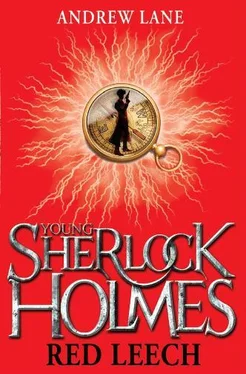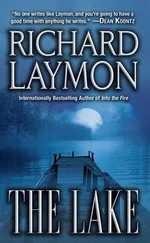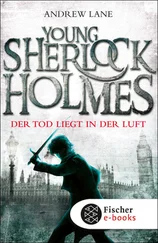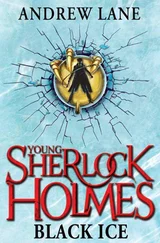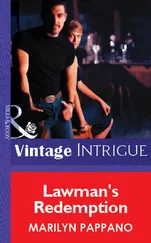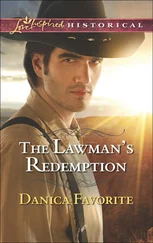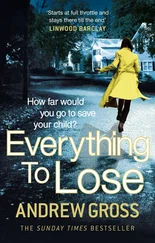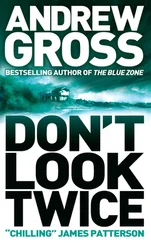Sherlock wondered where Crowe’s daughter Virginia was. There was no sign of her in the cottage, and given her headstrong attitude he wouldn’t expect her to stay in her room meekly while the grown-ups talked. Maybe she was out riding around the countryside, as she seemed to do a lot of the time. He hadn’t seen her horse, Sandia, outside the cottage.
He smiled. Virginia hated being inside. In some ways she was more like an animal than a person.
“Might I offer you a glass of sherry?” Crowe asked. “Can’t stand the stuff myself — tastes like something’s crawled into the barrel an’ died — but I keep a bottle for visitors.”
“Thank you, but no,” Mycroft replied smoothly.
“Sherlock does not drink, and I prefer a brandy at this time of day.” He glanced over at Sherlock. “America has still not managed to develop a national drink,” he said. “The French have wine and brandy, the Italians grappa, the Germans wheat beer, the Scots whisky and the English ale, but our transatlantic cousins are still in the process of working out their own identity.”
It sounded to Sherlock as if Mycroft wasn’t really talking about drinks at all, but trying to make some other, much more subtle point, but for the life of him he couldn’t work out what it was.
“The Mexicans have a drink they distil from cacti,” Crowe said, good-humouredly. “Tequila, they call it. Maybe we could adopt that.”
“What’s a cactus?” Sherlock asked.
“It’s a fleshy plant with a thick skin an’ covered with spikes,” Crowe responded. “It grows in the heat an’ the sand of the hot, arid lands in Texas an’ New Mexico an’ California. The thick skin keeps the water from evaporatin’ away, an’ the spikes stop cows an’ horses an’ suchlike from eatin’ it for the water content. Either the cactus is evidence of a Designer who makes things differently for different environments, so they can best survive, or it’s evidence that there’s some force which pushes livin’ organisms to change and develop so as to best survive in whatever place they find themselves, as Mr Charles Darwin contends. You take your money and you make your choice.”
“Back to the subject at hand, what have you been able to discover?” Mycroft asked.
Crowe shrugged. “I found the house. It’s empty. Looks like the occupants cleared out in a hurry. I talked to a farm worker along the road who saw them leave. He said there were four of them. One looked like he was asleep, one had his head all bandaged up, an’ the other two were scowlin’ like they’d got a long an’ unpleasant journey ahead of them.”
“The birds have flown.” Mycroft considered for a moment. “Is there any more evidence that the sleeping man was John Wilkes Booth?”
Crowe shrugged. “Save what your brother told us, nothin’. It’s instructive that his face was scarred by an old fire. The last thing that was heard of John Wilkes Booth was when he was involved in a shootout in a barn in Virginia with the Army. They’d tracked him down an’ ordered him to surrender, but he opened fire. The Army fired back, an’ somewhere along the line the barn caught fire. Prob’ly an oil lamp got knocked over. Anyhow, when the fire had died down the Army recovered a body from the wreckage. It was so badly burned they couldn’t identify it properly, but they assumed it was Booth. Looks now like Booth escaped but some accomplice got caught in the fire an’ couldn’t get out in time.” He paused. “Booth was always highly strung. Seems now that the enormity of what he did, an’ the subsequent escape an’ the fire, have caused his mind to snap. What’s interestin’ to me is that he’s obviously under the care an’ protection of an organization of some kind, an’ they obviously have a need for him. He ain’t goin’ to lead anyone any more, not from what the lad here has said, so what else can he do for them?”
“He’s a figurehead,” Mycroft pointed out. “Probably the most famous Confederate apart from General Lee and Jefferson Davis. If there’s even a stub of Confederate supporters left in America, and if they have even the slightest flicker of interest in overturning the new Presidency and installing one more sympathetic to their own beliefs, then John Wilkes Booth would be an ideal man for them to use as a rallying point. All they have to do is wheel him out at a few secret rallies and make a point about how he had the courage to try and bring down the Union with a few well-aimed bullets, and they could whip up a crowd into a frenzy.”
“That’s what I was afraid of,” Crowe said, nodding. “Don’t matter if he’s of unsound mind — they just have to dope him up enough so he can stand still on a stage, an’ they can make all kinds of speeches around him.” He paused for a moment. “What’s the position of the British Government on all of this?”
“I can’t speak for the British Government,” Mycroft said judiciously, “but I am aware that the Foreign Office is in favour of the current regime, and would not like to see the Confederacy resurgent. Slavery is an abhorrent practice, and it needs to be stamped out. The first thing a Confederate President would do is to reverse the advances made by President Lincoln and his successor. That will not do.”
Crowe sighed. “They’re goin’ to head back to the United States, aren’t they?”
Mycroft nodded.
“Then I have to follow ’em.”
“We could send a telegram,” Mycroft offered. “It would beat them across the Atlantic”
Crowe shook his head. “We don’t know which ship they’ll be on.”
“We can check the manifests,” Mycroft said. “Granted they’ll be travelling under false names, but we can look for four men travelling together, one of whom is obviously sick.”
“They won’t be travelling together.” Crowe sounded certain. “They’ll book tickets separately, and possibly engage the services of a nurse to look after Booth. No, we’ll be tryin’ to track down four individuals whose descriptions are vague an’ whose names are unknown.” He suddenly hit the arm of his chair with a balled fist, making Sherlock jump. “I’m a tracker. I have to track ’em. Simple as that. I’ll assume they’re headin’ for New York an’ start there.”
“I could help,” Sherlock said, surprising himself. “I’m the only one who’s seen them. I could go to the docks and see who boards the ships.”
“We don’t know where they’re embarkin’ from,” Crowe pointed out.
“It could be Southampton, or Liverpool, or even Queenstown,” Mycroft added gently. “One boy can’t cover three ports, no matter how clever he is.”
“But...” Sherlock started to say, and then trailed off. What he wanted to say was that Crowe couldn’t leave England, because Sherlock was only just beginning to understand the lessons that Crowe was teaching him, and if he was going to leave then he couldn’t take his daughter, Virginia, with him. Sherlock was developing feelings for her that he didn’t quite understand and he wanted to see where those feelings were going to lead him, even though they scared him. But he knew that neither of those arguments would hold any water when set against some vague but obviously important conspiracy directed against the Government of an entire country.
But it looked as though his life was about to be turned upside down.
Again.
Mycroft and Crowe started discussing ship timetables and ports of embarkation and disembarkation. Sherlock got bored very quickly. His mind kept attacking the problem, trying to find something that would mean Amyus and Virginia Crowe wouldn’t have to leave England.
“You still don’t know what the men look like,” he pointed out after a few minutes. “You can track them, but how will you know when you’ve found them? As long as they keep the man with the burn scars out of sight, they’ll just be three men. There’s nothing particularly distinctive about them, apart from their accents, and I’m assuming that once you get to a dock with a ship heading for America there’s going to be a lot of American accents around.”
Читать дальше
